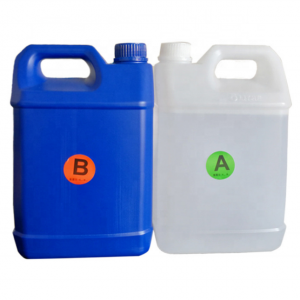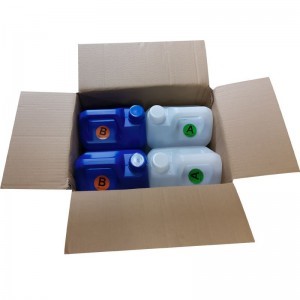Epoxy resin (Epoxy), also known as artificial resin, artificial resin, resin glue and so on. It is a very important thermosetting plastic, widely used in adhesives, coatings and other purposes, is a kind of high polymer.
Main material: epoxy resin
Nature: adhesive
Type: Divided into soft glue and hard glue
Applicable temperature: -60 ~ 100°C
Features:Dual -component glue, need AB mixed use
Application category: general adhesive, structural adhesive, temperature resistant adhesive, low temperature resistant adhesive, etc
Categories:
The classification of epoxy resin has not been unified, generally according to the strength, heat resistance grade and characteristics of the classification, there are 16 main varieties of epoxy resin, Including general adhesive, structural adhesive, temperature resistant adhesive, low temperature resistant adhesive, underwater, wet surface adhesive, conductive adhesive, optical adhesive, spot welding adhesive, epoxy resin film, foam adhesive, strain adhesive, soft material bonding adhesive, sealant, special adhesive, solidified adhesive, civil construction adhesive 16 kinds.
The classification of epoxy resin adhesives in the industry also has the following sub-methods:
1, according to its main composition, it is divided into pure epoxy resin adhesive and modified epoxy resin adhesive;
2. According to its professional use, it is divided into epoxy resin adhesive for machinery, epoxy resin adhesive for construction, epoxy resin adhesive for electronic eye, epoxy resin adhesive for repairing, as well as glue for transportation and ship.
3, according to its construction conditions, it is divided into normal temperature curing type glue, low temperature curing type glue and other curing type glue;
4, according to its packaging form, can be divided into single-component glue, two-component glue and multi-component glue;
There are other methods, such as solvent-free glue, solvent-based glue and water-based glue. However, the classification of components is more widely used.
Applications:
Epoxy resin is a high polymer, known for its excellent bonding capabilities. It can be used for bonding different materials together, creating strong and durable connections. Whether you are working on a DIY project or a professional construction job, epoxy resin is an ideal choice for ensuring secure and long-lasting adhesion. Its versatility in bonding properties makes it suitable for a variety of materials, including wood, plastic, glass, and metal.
But epoxy resin doesn’t stop at bonding; it is also widely used for pouring and potting applications. The ability to pour epoxy resin into molds or other objects allows for the creation of intricate and detailed designs. This feature makes it highly valued in artistic and decorative works, such as jewelry making, sculptures, and resin art. Additionally, epoxy resin’s potting capabilities make it a critical component in encapsulating electronic components, protecting them from moisture, dust, and other environmental factors.
In the chemical industry, epoxy resin is indispensable. Its chemical resistance, mechanical strength, and durability make it an excellent choice for various chemical processes. Additionally, its electrical insulation properties are highly sought after in the electronics and electrical appliances sectors. From circuit boards to insulating coatings, epoxy resin provides a reliable and efficient solution for enhancing the performance and longevity of electronic devices.
Moreover, epoxy resin is widely used in the construction field. Its exceptional strength and ability to withstand extreme weather conditions make it an ideal choice for coatings, flooring, and structural repairs. From residential buildings to industrial complexes, epoxy resin plays a crucial role in ensuring the durability and safety of structures.
The food industry also benefits from epoxy resin’s unique characteristics. Its ability to provide a smooth and glossy surface makes it suitable for food-grade coatings and linings. Epoxy resin helps maintain hygiene standards, preventing any contamination that could compromise food quality and safety.
Precautions:
1. It is best to wear glue with woven gloves or rubber gloves to avoid accidentally staining your hand.
2. Clean up with soap when skin contact. Generally, you will not hurt your hands. If your eyes are accidentally touched, rinse with a lot of water immediately. In severe cases, please seek medical treatment in time.
3. Please keep ventilation and prevent fireworks when using a lot of use.
4. When there is a large amount of leakage, open the window to ventilate, pay attention to the fireworks, then fill the lock with sand, and then remove it.
Package:10KG/PAIL; 10KG/CTN;20KG/CTN
Storage: To store in a cool place. To prevent direct sunlight, Non-dangerous goods transportation.
In conclusion, epoxy resin, also known as artificial resin or resin glue, is a versatile, thermosetting plastic that offers countless possibilities. Its excellent bonding, pouring, and potting properties make it a go-to choice for industries ranging from chemical to construction, electronics to food. The widespread applications of epoxy resin testify to its indispensability in various fields. So whether you are an artist, a manufacturer, or a construction professional, keep resin cast epoxy on your radar for all your adhesive and coating needs.
Post time: Jun-19-2023








